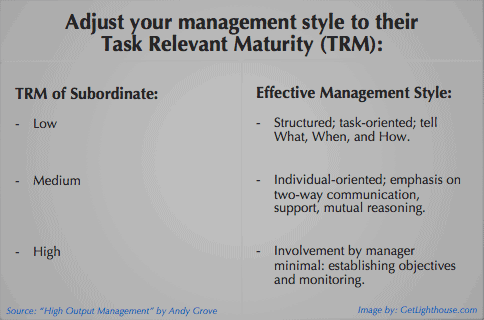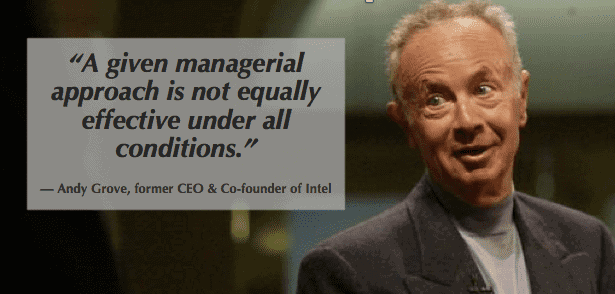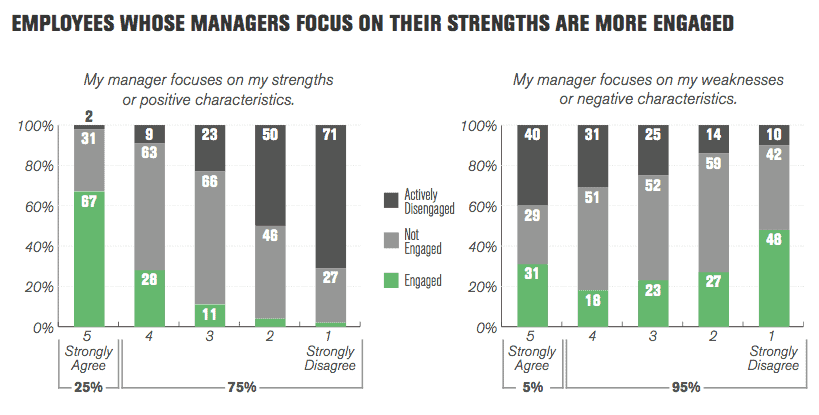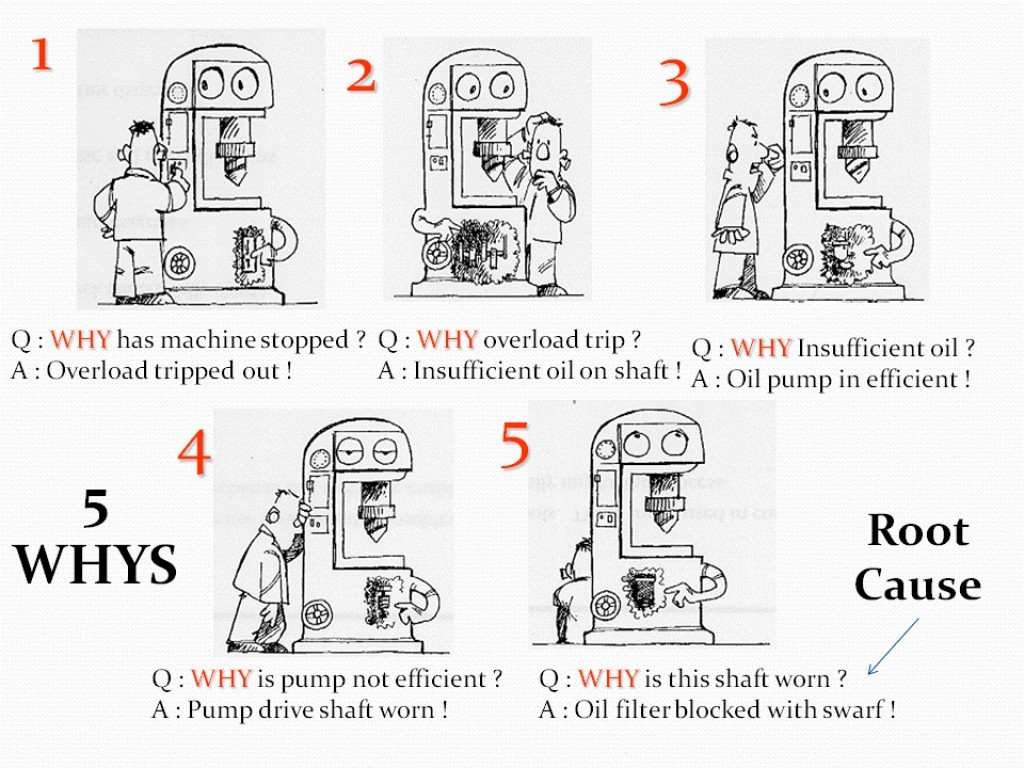Task Relevant Maturity. Is there a less sexy, technical-sounding phrase for managers?
Probably not. Yet, whether you work at a 100,000 employee juggernaut, or a hot startup with a mostly flat organization, you need to add this management concept (and those 3 letters: TRM) to your leadership approach. Otherwise, you may end up like this:
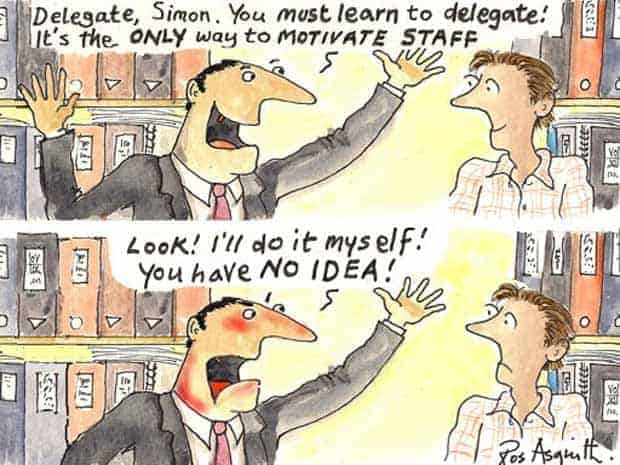
Courtesy of Guardian News & Media Ltd
The Most Underrated Management Concept: Task Relevant Maturity
Not understanding Task Relevant Maturity (TRM) creates a lot of problems for managers and their teams that can cascade into big issues. It can lead to failure when delegating (like the comic above), a loss of confidence by your best people, and an inability to deliver great results in an ever-changing market. Fortunately, these problems can be easily avoided.
Given how critical those issues are, we're going to be sure you fully understand TRM. By the end of this post, you're going to understand what this management concept is, who coined the phrase, and how you can apply it as a manager today.
Table of Contents:
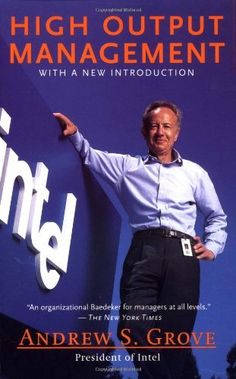
What is Task Relevant Maturity?
Here at Lighthouse, we're big fans of legendary co-founder & CEO of Intel, Andy Grove, and his book High Output Management. Task Relevant Maturity comes directly from it. Grove describes it in the following way:
"How often you monitor should not be based on what you believe your subordinate can do in general, but on his experience with a specific task and his prior performance with it - his task relevant maturity...as the subordinate's work improves over time, you should respond with a corresponding reduction in the intensity of the monitoring."
Sounds simple enough, right?
Unfortunately, most managers get this wrong. They develop trust in the abilities of a person and believe they can throw anything to them, including new projects, new roles, and new responsibilities, all while maintaining the same level of involvement and coaching as they had before.
If a manager assists their team member as much on new things as they did old, something will go wrong; not providing more assistance for new tasks and roles is likely to lead to failure by the team member. This can be both frustrating and embarrassing for them, and have a direct, painful impact on the bottom line of the company.
Avoid Rookie Mistakes
What about learning from their mistakes? Isn't failure a badge of honor now?
Not so fast. You may believe that, and in some cases it can be valuable, but consider the cost. As Grove wrote:
"He has to make his own mistakes. That's how he learns!"
The problem with this is that the subordinate's tuition is paid by his customers. And that is absolutely wrong. The responsibility for teaching the subordinate must be assumed by his supervisor, and not paid for by the customers of his organization, internal or external."
When you're managing people and developing leaders, there are times you'll ask them to do things they've never done before. It's essential at these times you become more hands on, even if they're not asking you to.
Trust, but verify.
A common mistake managers make is to try to apply a one-size-fits-all approach to managing their teams. That's a recipe for disaster. You neither want to be overbearing to your team members that are experienced and comfortable in their tasks at hand, nor be missing when a team member is struggling alone on a new task.
The key is to keep a pulse on everyone on your team, and adjust how hands on you are according to how they're doing. Checking in on a team member working on something new will make it safe for you or they to acknowledge and fix problems when they're small. Meanwhile, the occasional check in on a team member who you trust and is experienced in the task at hand can help you avoid a surprise when it may be more costly, or too late to fix.
A common issue we've heard many times is that after a promotion, team members struggle. Unfortunately, after just getting selected for the new role, the pressure to succeed and prove they were worthy of the new title makes them feel afraid to bring up struggles. They may feel they need to figure it out on their own or simply respect their manager's time so much they don't want to bother them. This is why you must check in and ask. An open door policy doesn't work.
How to Apply Task Relevant Maturity
There are many ways you can apply this concept to your day to day and week to week activities as a manager. Here's just a few:
Play to your team's strengths
With more than a few people to manage, you'll quickly find you cannot be involved with everything all of your people do. This is a good thing! Developing trust in their abilities to deliver can give your people the autonomy they desire and help you avoid micromanaging.
The key is to learn what your people's strengths are. Their strengths are where they have the Task Relevant Maturity for you to be relatively hands off with them.
The time you save in being hands off with those on your team working in areas of strength can then be invested in being more hands on with those working on something they're inexperienced in.
Help with engagement
Recognizing their strengths can also help with morale and motivation. By giving people work to leverage their strengths, they'll be tapping into a key part of being engaged in the workplace as we learned from Gallup's "State of the American Manager" study from earlier this year:
If you strike a good balance between new, challenging tasks you're hands on helping them with, and giving them work that uses their strengths, you'll both win. They're adding new strengths, while getting the chance to work on old ones, while you will have the right amount of time to help people as their Task Relevant Maturity dictates.
Adjust your one on ones
Your one on ones with your team members are the perfect time to discuss their Task Relevant Maturity.
First, you can should adjust the frequency of your one on ones based on their current responsibilities. The more comfortable you are with their TRM, the less often you'll need to check in (every 3-4 weeks).
Meanwhile, when you promote them, or give them a new challenge they lack experience in, this is the time you should meet more often (every 1-2 weeks) no matter how busy your schedule. This is when they need you most and will be set up to fail and be frustrated otherwise.
The other key is to adjust what you talk about in your one on ones. As they develop more experience in their roles and responsibilities, the kinds of questions you'll ask and what you'll discuss will shift. We've recreated this chart from Grove's High Output Management to highlight how that may go:
When they're inexperienced, you'll be going over a lot of the skills and processes to succeed. Then, as they grow and learn, you can be more hands off, and focus on problem solving and high level progress.
A story of TRM gone wrong.
A friend of mine was promoted at his company after doing great work for them for over a year. It was clear that for that job his Task Relevant Maturity was excellent. However, when he was promoted, he was suddenly managing people for the first time, and had a series of challenges where he had much lower TRM than he had before.
Unfortunately, rather than stepping up to help guide him through these challenges, my friends manager actually started meeting with him less often. This led to him becoming frustrated and disengaged at work. It was only after others noticed and told his manager it seemed like he might quit that the manager stepped in.
This temporary assistance was half-hearted and too late. Just a few months later, my friend quit and found a new job where he's now much happier and feels more supported.
If you don't get Task Relevant Maturity right, it can not only affect the quality of your team's work, but also cause turnover.
Ask good questions
Asking good questions is a critical management skill. In particular, to effectively understand where your people are on the spectrum of Task Relevant Maturity, asking good questions is particularly helpful.
When you ask questions, it provides more information and context to a situation. It can save you from jumping to conclusions and better diagnose a problem before you step in and start giving advice and help. It can also help you quickly learn how a project is going that may otherwise have not been raised by your team member on their own.
The power of 5 why's
One of the best lines of questioning you can use is the simple process of 5 why's. Rather than stopping at the surface of uncovering the problem, you instead probe deeper, asking why repeatedly until you get to the true root cause.
This can work for both soft and hard skill issues. Going through the process with one of your team members will often reveal many great teachable moments that you'd otherwise miss if you stayed only at the surface of a problem.
5 Why's also saves you time in the long run. If all you do is treat symptoms on the surface, it's likely that problems will reoccur, demanding more of your attention and time.
Meanwhile, when you get to the root cause, you're more likely to ensure that the problems won't happen again. The second and third order issues will often naturally be resolved, making your time coaching even more efficient.
----
Being a manager means mastering many new skills. One key is understanding the leadership paradox of when to be consistent, and when to be flexible. Another is learning to develop the people around you, while leaning on their strengths. If you understand and apply the management concept of Task Relevant Maturity, you'll master both.

